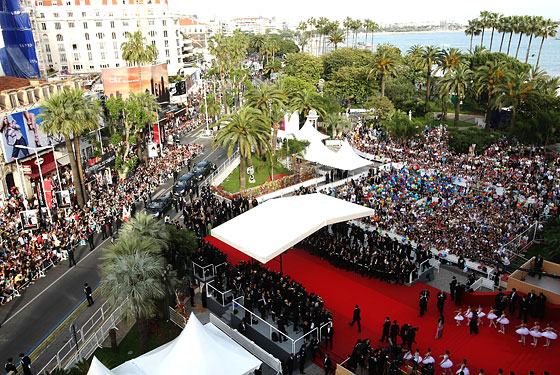
Welcome to Cannes! Your Vulture editors are stuck in New York, but special correspondent Dennis Lim is on the ground on the French Riviera, and to raise the curtain on the festivalÔÇÖs 62nd iteration ÔÇö which opened today with a screening of Up ÔÇö he sent us the following dispatch.
No matter the economic climate or the state of international art cinema or the concerns over global pandemics (only one face mask spotted at the Palais des Festivals so far), certain questions always come to the forefront as the Cannes Film Festival gets under way. Here are five of them, along with our best-guess answers.
1. WhoÔÇÖs poised for a comeback?
The standard line on this yearÔÇÖs slate is that it has the safe, clubby feel of a major-auteur class reunion. But while someone like Pedro Almod├│var, in competition yet again with the meta-movie Broken Embraces, may have reached the height of clockwork reliability, there are many more name directors who will be counting on a reversal of fortunes. Lars von TrierÔÇÖs reputation has been on a downward slide since Dogville. The horror flick Antichrist is his first movie since being hospitalized for depression. Jane Campion hasnÔÇÖt made a film since 2003ÔÇÖs In the Cut, and thereÔÇÖs quite a bit of anticipation surrounding her Keats biopic, Bright Star. (The last time she went to Cannes, The Piano won the Palme dÔÇÖOr.) And donÔÇÖt count out the oldest director here, 86-year-old Alain Resnais, who hasnÔÇÖt had a film in competition in nearly three decades. The early word from some French critics suggests that his latest, Wild Grass, could well be the movie that embodies the premise of this yearÔÇÖs opener, Up: old geezer tries something new.
2. WhatÔÇÖs the big picture?
The festival roundup is the film journalistÔÇÖs bane, requiring a dogged search among dozens of movies for common themes, real and imagined. Based solely on the terse and somewhat cryptic catalog descriptions, expect much to be made of the abundance of killers, revenge plots, and repressed homosexuality.
3. Where will the next new wave come from?
Cannes is invariably ground zero for tomorrowÔÇÖs world-cinema hot spot. Two years ago, 4 Months, 3 Weeks and 2 Days won the Palme dÔÇÖOr, solidifying a Romanian film renaissance that began two years before that with The Death of Mr. Lazarescu. This year could well herald an international breakthrough for Filipino cinema. Brillante Mendoza, who provoked more than a few walkouts last year with Serbis, about a family-run porn theater, is back with the serial-killer film Kinatay, and there are two other movies from the Philippines in the official selection, one directed by and the other co-directed by a 25-year-old prodigy named Raya Martin.
4. WhoÔÇÖs getting booed (first)?
Vocal audience disapproval is not just expected here, itÔÇÖs a storied tradition. This yearÔÇÖs festival poster (available here) is inspired by Michelangelo AntonioniÔÇÖs LÔÇÖavventura (1960), now considered a classic but heckled so viciously at its Cannes press screening that the director and his star, Monica Vitti, fled the theater. More recently, Sofia CoppolaÔÇÖs Marie Antoinette met with what Variety memorably described as ÔÇ£Gallic-accented boosÔÇØ (b├│o?). ThereÔÇÖs no shortage this year of work by onetime enfant terribles: von TrierÔÇÖs Antichrist; Thirst, a vampire movie by Park Chan-wook (Oldboy); and Enter the Void, the latest nihilist provocation from Gaspar No├® (Irreversible).
5. Who will take home the Palme dÔÇÖOr?
This yearÔÇÖs jury, headed by French screen icon Isabelle Huppert, is the usual incongruous United Nations of red-carpet-ready actresses (Robin Wright Penn, Asia Argento, Shu Qi) and festival-approved auteurs (James Gray, TurkeyÔÇÖs Nuri Bilge Ceylan, KoreaÔÇÖs Lee Chang-dong). In the days to come, the most avid awards forecasters will theorize about screening times (the significance of an early or late slot), share allegedly leaked jury opinions, and endlessly parse preexisting relationships between jurors and the filmmakers in competition.
The prolific Huppert, for instance, won the Best Actress prize here in 2001 for The Piano Teacher, directed by Michael Haneke, a perennial Cannes runner-up who could have an edge this year with his fascists-in-training period piece The White Ribbon. Huppert is also said either to have been fired from or to have pulled out of Quentin TarantinoÔÇÖs Inglourious Basterds, the most heavily hyped competition title (the role ultimately went to Maggie Cheung). The rumor went unaddressed at this afternoonÔÇÖs jury press conference. But a French journalist did wonder out loud whether anyone would dare oppose the famously uncompromising Huppert. None of the jurors spoke up, so Huppert, forcing a smile, coolly responded: ÔÇ£IÔÇÖll go against myself if necessary.ÔÇØ

